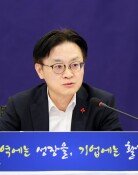Big Rebound for Stock Markets
On the rebounding stock prices in the U.S. and Europe following the FRBs discount rate cut, Koreas KOSPI index soared yesterday by the greatest margin for a single day in its history. The won-dollar and won-yen exchange rates dropped again, while bond prices weakened. That means that the domestic financial market, which roiled on concerns over a possible credit crunch, is showing signs of calming down.
The KOSPI ended 93.20 points (5.69 percent) up from the previous trading day at 1,731.27, going up again for the first time in four trading days. The KOSDAQ index also closed up 48.11 points (7.14 percent) at 721.59.
The gain was the largest ever for the KOSPI since January 1983 when the index began to be tracked, replacing the former record of a 66.28-point gain set on March 2, 2000. The growth rate is also the highest level in five years and six months after a 7.64-percent growth spike on February 14, 2002.
As futures prices soared on the KOSPI and KOSDAQ markets, the Korea Exchange tripped a side car, causing a five-minute suspension of program trading, which happens when futures price fluctuate more than five percent on the KOSPI and six percent on the KOSDAQ for more than one minute.
It was the first time in three years and three months since May 19, 2004, that the measure was triggered on the KOSPI due to a stock price rise. It was employed on August 16 due to a stock price plunge.
With skyrocketing stock prices, the market capitalization for listed companies on KOSPI and KOSDAQ combined increased to 52.63 trillion won.
Asian stock markets all rallied, including those in Japan and China.
Japans Nikkei 225 average, which hit its yearly low last weekend, closed up 458.80 yen (3.00 percent) at 15,732.48 yen, while Chinas Shanghai Composite Index and Taiwans TAIEX were up 5.33 percent and 5.26 percent, respectively.
With the stock market rally, the won-dollar and won-yen exchange rates nosedived.
The won exchange rate against the dollar in Seouls foreign exchange market dropped by 7.40 won per dollar from August 17 at 943.00 won, posting the biggest decline this year. The won-yen exchange rate also decreased 21.71 won per 100 yen to 822.86 won, stopping the strengthening of the Japanese currency.
Experts explained that the Feds discount rate cut mitigated jitters in the foreign exchange markets, weakening demand for the safe dollar.
swon@donga.com ssoo@donga.com




![반찬통 착색 고민 끝…‘두부용기’ 버리지 말고 이렇게 쓰세요 [알쓸톡]](https://dimg.donga.com/c/138/175/90/1/wps/NEWS/IMAGE/2026/01/09/133126593.3.png)


